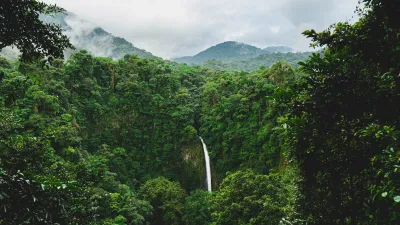
As a frequent traveler, it is easy for me to see why Costa Rica is the most popular tourist destination in Central America. Of course, there is no arguing over the fact that Mother Nature has done some marvelous work in this country; from an environmental standpoint the forest areas are absolutely awe-inspiring. While I do enjoy the ecotourism side of a Costa Rican holiday, I am actually more of a culture-vulture. My travels are all about the people, food, history, and occasionally nightlife -- which is why I need to adjust to monetary guidelines fairly quickly.
Costa Rica money practices are a little different from some of the other places I have visited. So, to save you some of the confusion, I feel it is only right to share what I have learned with you. Costa Ricans are among the most welcoming people I have ever met. Laid back and friendly, they are only too happy to share all of their knowledge and experience with visiting tourists. It is only fair to adapt to Costa Rica money requirements in return for their unending hospitality.
One thing I learned quite quickly is that Traveler's Checks are an absolute no-no. As I mentioned earlier, I do a fair amount of touring. I am almost always armed to the teeth with Traveler's Checks, since they are supposedly the safest means of transporting money on one's travels. Until recently, this had never been a problem. Imagine my surprise when trying to convert one of these checks into cash at a local Costa Rican bank only to be politely but firmly sent on my way. No one in the whole of Costa Rica accepts Traveler's Checks -- that is a simple fact. It just is not lucrative enough in their economy.
If you need to make your money more accessible but are not happy to carry enormous wads of cash, I would suggest upping your daily withdrawal limit and alerting your bank to the fact that you will be using your debit or credit card from another country. It sounds complicated but in reality, it could not be simpler. A quick phone call was all it took for me to make arrangements with my bank back home. Within a few hours I was happily walking through town, enjoying the prospect of spending my hard-earned money on some fabulous local goods.
I quickly learned that in Costa Rica money lore, cash is king. More to the point, small bills are all-powerful. With counterfeiting concerns, locals are more likely to accept smaller bills. Prepare to back your hundred-dollar bills away and use only twenty-dollar bills or less. With the exchange rate working in your favor, you will feel like royalty using only smaller bills anyway. If, like me, you want to experience true Costa Rican culture, you are going to want to spend your cash with the friendly street vendors rather than the glitzy hotels -- so large bills probably will not get you far anyway.
Costa Rican restaurants are a gastronomic delight. Once you have experienced the heady spices in their fresh, luscious dishes, you will be hooked for life. I gained quite a few extra pounds on my holiday, and I have no regrets. Remember that a 10% service fee may apply in restaurants. Usually this is voluntary, though some establishments may have signs up. If the service was truly impeccable, I would suggest a 20% tip. It is only good manners to show your appreciation for the hard-working and sometimes underappreciated waiting staff.
In general, try to avoid using your credit card. The tax levies are borderline ridiculous. Almost everyone in Costa Rica accepts U.S. Dollars, though you may receive Colones as change. the currency in Costa Rica is known as the Colon, the plural of which is Colones. While there are certain places that will accept USD as payment, the change that will be provided back to you will be in Colones only. Therefore, it makes sense to have a good idea about the conversion rate.
The only Colon coin available is the 500 colones coin, which is equivalent to 1 US Dollar. The other denominations are paper money in 1000 colones, 2000 colones, 5000 colones, 10,000 colones and so on. To convert Colones to Dollars, a simple calculation is all you need. Take the first digit of the coin or bill, multiply by 2, and then drop the last three zeros. This final number is the monetary value in USD.
Costa Rica money practices are fairly easy to grasp and adhere to. Adjusting the way you handle money is a small sacrifice to pay for a magnificent holiday.
 Browse All
Browse All
